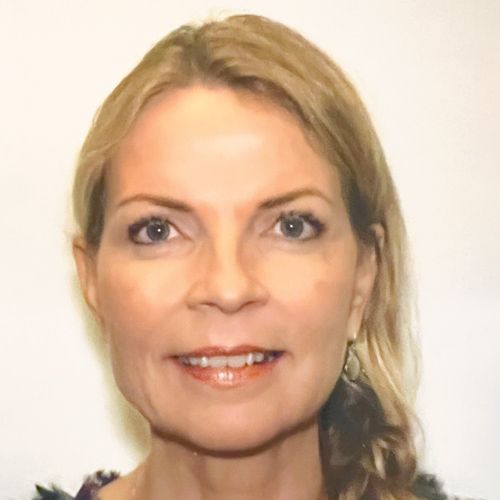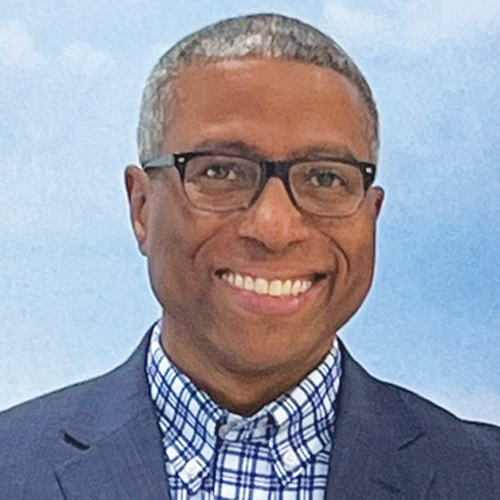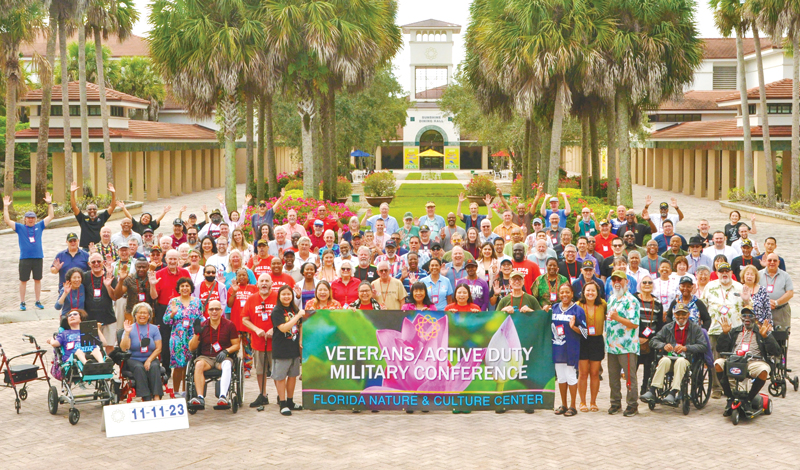Toward the Active Duty and Military Veterans / First Responders Conference at the SGI-USA Florida Nature and Culture Center (FNCC), the World Tribune sat down with the group’s national leaders, Carla Colton and Mark Woods, to learn about their mission. The group includes veterans, active duty military, national guard or reserve, Department of Defense personnel, first responders (law enforcement officers, firefighters, EMT, etc.) and their adult family members. Additionally, any members who support base military SGI-USA activities are highly encouraged to attend.
World Tribune: Thank you for meeting us with. To start, could you share about your background in faith and career?

Carla Colton: I was about midway into my career when I was introduced to SGI Nichiren Buddhism by a dear friend and her husband, himself a Vietnam War veteran. It changed everything and opened up my career.
I served four years active duty in the U.S. Air Force. Early on, I worked in aircraft maintenance and flight operations and had no particular career aspirations, even after I accepted a civil service appointment in the Department of Defense.
Everything I learned in the SGI—about working with and fostering people—transformed my career. I served with the Department of Defense for 32 years. In my last eight years, I served as program manager of Alternative Dispute Resolution and as a federal mediator for various agencies.
People often ask how you can be Buddhist in the military. At the end of the day, we’re all human beings. And Buddhist concepts like transforming karma into mission as well as Ikeda Sensei’s humanistic example were the foundation I could always fall back on amid the challenges I faced.

Mark Woods: Two things really impacted my upbringing. One was seeing my mom transform our family with this Buddhist practice. The other was learning about the assassination of my grandfather who was a mayor of a town in southern Illinois. As a young person of color, this impacted my view of justice and law enforcement.
As I grew into my Buddhist practice, it alleviated the anger I felt toward law enforcement, and I actually found myself pursuing a career in criminal justice. Eventually, I became a police officer, but the intensity of the work made me question my path.
At this crossroad, I had the opportunity to attend an SGI youth training course in Japan in September 2001. I went, seeking how to reframe my mission as an officer and a Buddhist. Then, on our way back, our flight was rerouted due to the 9/11 attacks. As tragic as the attacks were, it crystallized in me why I, as a Buddhist, had to be in this field.
WT: As Carla mentioned, some question whether it’s possible to be a Buddhist in the military, law enforcement or as a first responder. What is your view on that?
Mark: To this question, I always respond: Isn’t this where you would want us? We need people in these roles who are equipped with the belief that everyone has a Buddha nature.
I grappled with understanding that there’s no separation between me as the Buddhist and me as an officer. Oftentimes, we come to adopt a guise at work to navigate various pressures. I think this may be similar for our military folks and other first responders.
One important lesson I learned was that my work doesn’t define me. It is an aspect of my mission, but my true mission is kosen-rufu. Everything is an opportunity to share Buddhism, to show others that there’s a different way forward.
As a law enforcement officer, I wear a bulletproof vest, a badge and a gun. But the most valuable equipment is my faith. It’s my ability to sit in front of the Gohonzon and remind myself that, whatever I see when I walk out that door, the first thing I need to see is the other person’s humanity.
WT: What do you feel is the mission of this group at this time?
Carla: It’s the same mission as that of Ikeda Sensei and the SGI—to spread the humanistic philosophy of Buddhism and foster the youth.
I was 19 when I joined the Air Force. We have a huge population of young people who join for the opportunities to be gained. Every year, thousands of young service members are introduced to Buddhism during their basic training through the SGI-USA introductory meetings held at military bases across America.
These careers are very communal. People live, travel and go through training together, resulting in deeper camaraderie. At the same time, people from all walks of life gather, so with great diversity comes more opportunities for human revolution!
That’s where Buddhism is key. We have to teach young people to see and connect with one another as human beings. Much of the violence we see today is the result of alienation and the tendency to disconnect and dehumanize others. And there are differing opinions in society on what is justice, what is right. But we must foster people who, regardless of differences, can be present and respond to the crisis, to the person, as a fellow human being.
WT: The theme of the conference is “Sharing Sufferings and Joy as Comrades in Faith.” What is the significance behind this theme?
Carla: What joins us as a group is our sense of mission to protect and serve, and equally, the struggles that come with that! This conference exists to support the youth who are navigating their careers, to encourage one another and to repay our debt of gratitude to and learn from our veterans who are true pioneers of kosen-rufu.
Our motto is “In Pursuit of Peace.” When we look at history and today, wars and conflicts are the ongoing saga of humanity. But Sensei teaches through his example that peace isn’t something that’s static or tranquil—peace is action. It’s dialogue, making humanistic connections one after another and never giving up. We’re comrades in faith, as Bodhisattvas of the Earth, in this ongoing effort.
Mark: It’s our determination that we see more Buddhists in these fields. We absolutely need that. It is a unique and challenging path to walk. Amid society’s violence, divisiveness and frustrations, we’re tasked to put our well-being on the line to serve others. Sure, it’s easy to dehumanize others and be dehumanized, but there’s also the challenge of trauma and losing sight of our own humanity.
That’s why we’re here to remind one another that we’re walking this path as Buddhas, that none of us is alone in our struggles, and that peace begins with us.
You are reading {{ meterCount }} of {{ meterMax }} free premium articles

